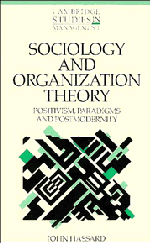Book contents
- Frontmatter
- Contents
- List of figures and tables
- Acknowledgements
- Introduction
- 1 Foundations of orthodoxy
- 2 The hegemony of systems
- 3 From functionalism to fragmentation
- 4 Closed paradigms and analytical openings
- 5 Multiple paradigm research
- 6 Postmodernism and organization
- Notes
- Bibliography
- Author index
- Subject index
- Cambridge Studies in Management
- Frontmatter
- Contents
- List of figures and tables
- Acknowledgements
- Introduction
- 1 Foundations of orthodoxy
- 2 The hegemony of systems
- 3 From functionalism to fragmentation
- 4 Closed paradigms and analytical openings
- 5 Multiple paradigm research
- 6 Postmodernism and organization
- Notes
- Bibliography
- Author index
- Subject index
- Cambridge Studies in Management
Summary
Since the early 1970s, there have been numerous attempts to define the professional community structure of social science. Writers have catalogued a range of alternatives to the apparently declining but still dominant theoretical paradigm of structural-functionalism. The process of specifying new paradigms has been predicated mainly on Thomas Kuhn's (1962) work in the history of science, in which he distinguishes between periods of ‘normal’ and ‘revolutionary’ activity. In line with Kuhn's thinking, sociologists have argued that the emergence of new influential perspectives signals sociology is currently experiencing a period of scientific revolution, or ‘science-in-crisis’.
The book examines this ‘crisis’ thesis as it applies to the branch of sociology concerned with organizations. We trace the history of the influential systems-theory approach to organizational analysis from its origins in positivist and evolutionary philosophy, through its development under sociological functionalism, to its deconstruction by radical structuralists and postmodernists. In highlighting the often acrimonious debate between the systems theorists and the critics of organization theory, we offer support for the crisis theory perspective.
This position, however, cannot be given unqualified support. In particular, we question its contention that paradigms are ‘incommensurable’. Rather than advocate the hermetic sealing of systems theory or other discourses, we suggest that – as paradigms – they are ultimately pervious phenomena. We argue that seemingly incommensurable theoretical positions can be mediated, notably through recourse to language-game philosophy.
- Type
- Chapter
- Information
- Sociology and Organization TheoryPositivism, Paradigms and Postmodernity, pp. 1 - 3Publisher: Cambridge University PressPrint publication year: 1993



